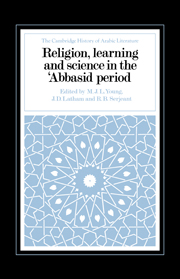Book contents
- Frontmatter
- Epigraph
- Contents
- List of plates
- Editorial preface
- List of abbreviations
- Map Literary, political and religious centres in the ʿAbbasid period
- 1 Sunnī theology
- 2 Shīʿī theological literature
- 3 Ibāḍī theological literature
- 4 Quranic exegesis
- 5 The prose literature of Ṣufism
- 6 Philosophical literature
- 7 Arabic lexicography
- 8 Arabic grammar
- 9 Islamic legal literature
- 10 Administrative literature
- 11 Arabic biographical writing
- 12 History and historians
- 13 Faṭimid history and historians
- 14 Mathematics and applied science
- 15 Astronomy
- 16 Astrology
- 17 Geographical and navigational literature
- 18 The literature of Arabic alchemy
- 19 Arabic medical literature
- 20 Al-Kindī
- 21 Al-Rāzī
- 22 Al-Fārābī
- 23 Ibn Sīnā
- 24 Al-Bīrūnī and the sciences of his time
- 25 Al-Ghazālī
- 26 Christian Arabic literature in the ʿAbbasid period
- 27 Judaeo-Arabic literature
- 28 The translation of Greek materials into Arabic
- 29 Didactic verse
- Glossary
- Bibliography
- Index
13 - Faṭimid history and historians
Published online by Cambridge University Press: 05 July 2014
- Frontmatter
- Epigraph
- Contents
- List of plates
- Editorial preface
- List of abbreviations
- Map Literary, political and religious centres in the ʿAbbasid period
- 1 Sunnī theology
- 2 Shīʿī theological literature
- 3 Ibāḍī theological literature
- 4 Quranic exegesis
- 5 The prose literature of Ṣufism
- 6 Philosophical literature
- 7 Arabic lexicography
- 8 Arabic grammar
- 9 Islamic legal literature
- 10 Administrative literature
- 11 Arabic biographical writing
- 12 History and historians
- 13 Faṭimid history and historians
- 14 Mathematics and applied science
- 15 Astronomy
- 16 Astrology
- 17 Geographical and navigational literature
- 18 The literature of Arabic alchemy
- 19 Arabic medical literature
- 20 Al-Kindī
- 21 Al-Rāzī
- 22 Al-Fārābī
- 23 Ibn Sīnā
- 24 Al-Bīrūnī and the sciences of his time
- 25 Al-Ghazālī
- 26 Christian Arabic literature in the ʿAbbasid period
- 27 Judaeo-Arabic literature
- 28 The translation of Greek materials into Arabic
- 29 Didactic verse
- Glossary
- Bibliography
- Index
Summary
Although Faṭimid rule in Islamic history lasted only for about two and a half centuries (297/909 to 567/1171), it was of greater importance than any of the other provincial regimes which arose during the decline of the ʿAbbasid caliphate, for a number of reasons. It was the product of a movement, popularly known as Ismāʿīlī, the history of which goes back to the beginnings of the ʿAbbasid period, that is the time of the Shīʿī imam Jaʿfar al-Ṣādiq. It ushered in the first serious imperial challenge to the empire of the caliphate at Baghdad. Its intellectual legacy was as brilliant as those of the most productive periods of Islam. Lastly, its impact was felt till much later times, judging by the histories of the period that continued to be written, despite the withering away of Faṭimid religious influence in Egypt and Syria.
The Faṭimid daʿwah (mission), unlike any other mission, did not simply create a state, but continued to guide it throughout its existence and created an extensive literature. Never in Fatimid history was its mission geared to mass proselytization. Its teachings were addressed to a candidate (mustajīb) seeking admission to the community. It aimed at creating an elite class of dāʿīs (religious missionaries cum political agents) supported by a political base such as the Faṭimid caliphate. Once that base was gone, the community was destined to disappear, as the elite had been wiped out and there had in any case never been a mass following of the faith.
- Type
- Chapter
- Information
- Religion, Learning and Science in the 'Abbasid Period , pp. 234 - 247Publisher: Cambridge University PressPrint publication year: 1990



